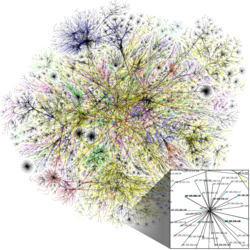Human rights and the Internet
A number of human rights have been identified as particularly relevant in relation to the Internet. These include freedom of expression, privacy, and freedom of association. Furthermore, the right to education and multilingualism, consumer rights, and capacity building in the context of the right to development have also been identified. [3] [4]
In December 2003 the World Summit on the Information Society (WSIS) was convened under the auspices of the United Nations (UN). After lengthy negotiations between governments, businesses and civil society representatives the WSIS Declaration of Principles was adopted [8] reaffirming human rights: [8]
We reaffirm the universality, indivisibility, interdependence and interrelation of all human rights and fundamental freedoms, including the right to development, as enshrined in the Vienna Declaration. We also reaffirm that democracy, sustainable development, and respect for human rights and fundamental freedoms as well as good governance at all levels are interdependent and mutually reinforcing. We further resolve to strengthen the rule of law in international as in national affairs.
The WSIS Declaration also makes specific reference to the importance of the right to freedom of expression in the "Information Society" in stating: [8]
We reaffirm, as an essential foundation of the Information Society, and as outlined in Article 19 of the Universal Declaration of Human Rights, that everyone has the right to freedom of opinion and expression; that this right includes freedom to hold opinions without interference and to seek, receive and impart information and ideas through any media and regardless of frontiers. Communication is a fundamental social process, a basic human need and the foundation of all social organisation. It is central to the Information Society. Everyone, everywhere should have the opportunity to participate and no one should be excluded from the benefits of the Information Society offers.
The 2004 WSIS Declaration of Principles also acknowledged the need to prevent the use of information and technologies for criminal purposes, while respecting human rights. [9] Wolfgang Benedek comments that the WSIS Declaration only contains a number of references to human rights and does not spell out any procedures or mechanism to assure that human rights are considered in practice. [10]
Internet Bill of Rights and Charter on Internet Rights and Principles (2007-2010)
The Dynamic Coalition for an Internet Bill of Rights held a large preparatory Dialogue Forum on Internet Rights in Rome, September 2007 and presented its ideas at the Internet Governance Forum (IGF) in Rio in November 2007 leading to a joint declaration on internet rights. [11] At the IGF in Hyderabad in 2008 a merger between the Dynamic Coalitions on Human Rights for the Internet and on Principles for the Internet led to the Dynamic Coalition on Internet Rights and Principles, which based on the APC Internet Rights Charter and the Universal Declaration of Human Rights elaborated the Charter of Human Rights and Principles for the Internet presented at the IGF in Vilnius in 2010, which since has been translated into several languages.
Global Network Initiative (2008)
On October 29, 2008, the Global Network Initiative (GNI) was founded upon its "Principles on Freedom of Expression and Privacy". The Initiative was launched in the 60th Anniversary year of the Universal Declaration of Human Rights (UDHR) and is based on internationally recognized laws and standards for human rights on freedom of expression and privacy set out in the UDHR, the International Covenant on Civil and Political Rights (ICCPR) and the International Covenant on Economic, Social and Cultural Rights (ICESCR). [12] Participants in the Initiative include the Electronic Frontier Foundation, Human Rights Watch, Google, Microsoft, Yahoo, other major companies, human rights NGOs, investors, and academics. [13] [14]
John Harrington dismissed the impact the GNI as a voluntary code of conduct, calling instead for bylaws to be introduced that force boards of directors to accept human rights responsibilities. [15]
United Nations Human Rights Council (2011-2012)
Some of the 88 recommendations made by the United Nations Special Rapporteur on the promotion and protection of the right to freedom of opinion and expression in a May 2011 report to the Human Rights Council of the United Nations General Assembly [16] supported the argument that internet access itself is or should become a fundamental human right. [17] [18]
- 67. Unlike any other medium, the Internet enables individuals to seek, receive and impart information and ideas of all kinds instantaneously and inexpensively across national borders. By vastly expanding the capacity of individuals to enjoy their right to freedom of opinion and expression, which is an "enabler" of other human rights, the Internet boosts economic, social and political development, and contributes to the progress of humankind as a whole...
- 79. The Special Rapporteur calls upon all States to ensure that Internet access is maintained at all times, including during times of political unrest.
The United Nations Human Rights Council declared internet freedom a Human Right in 2012. [19]
This page is based on this
Wikipedia article Text is available under the
CC BY-SA 4.0 license; additional terms may apply.
Images, videos and audio are available under their respective licenses.


